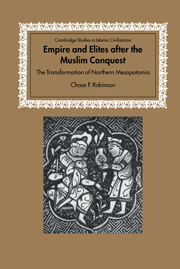Book contents
- Frontmatter
- Contents
- Preface
- Acknowledgements
- List of abbreviations
- Note on dates and citations
- Map: The Fertile Crescent in the early Abbasid period
- 1 Conquest history and its uses
- 2 The seventh-century Jazira
- 3 From garrison to city: the birth of Mosul
- 4 Christian élites in the Mosuli hinterland: the Shahārija
- 5 Islam in the north: Jaziran Khārijism
- 6 Massacre and narrative: the Abbasid Revolution in Mosul I
- 7 Massacre and élite politics: the Abbasid Revolution in Mosul II
- Conclusion
- Bibliography
- Index
- Other titles in the series
4 - Christian élites in the Mosuli hinterland: the Shahārija
Published online by Cambridge University Press: 13 August 2009
- Frontmatter
- Contents
- Preface
- Acknowledgements
- List of abbreviations
- Note on dates and citations
- Map: The Fertile Crescent in the early Abbasid period
- 1 Conquest history and its uses
- 2 The seventh-century Jazira
- 3 From garrison to city: the birth of Mosul
- 4 Christian élites in the Mosuli hinterland: the Shahārija
- 5 Islam in the north: Jaziran Khārijism
- 6 Massacre and narrative: the Abbasid Revolution in Mosul I
- 7 Massacre and élite politics: the Abbasid Revolution in Mosul II
- Conclusion
- Bibliography
- Index
- Other titles in the series
Summary
I noted earlier that the province of al-Mawṣil fits the long-familiar Iraqi pattern, according to which non-Muslim indigenous élites levied taxes for a small Muslim/Arab ruling class claiming the exclusive right of sovereignty. In Iraq proper, the most prominent of these élites were the dihqāns, ‘village headmen’ who prospered for much of the seventh century, and whose star began to decline at the tail-end of that century, particularly as Arabisation and Islamicisation took hold. In the province of Mosul, the village élite was topped by the shahārija (sing. shahrīj), and of these we know hardly more than did Theodor Nöldeke and Georg Hoffmann, both of whom wrote more than a century ago; were it not for Morony's work on Iraq, Islamicists might have forgotten about them completely. Nöldeke defined the shahrīg of the Sasanian period as a regional official (‘Oberhaupt eines Kreises’), relying principally on the testimony of al-Ya'qūbī, who glosses the shahrīj as ra' īs al-kuwar. This gloss was in harmony with Nöldeke's understanding of the Middle Persian shahr, which he took to mean ‘region’ or ‘district’; it also seemed to complement the testimony of both al-Masʿūdī, who places the shahārija just below the ‘three great families’ (al-abyāt al-thalātha) of the Sawād, but above the dihqāns, and that of the ninth-century Nestorian Thomas of Marga, who reports that shahārija of his period collected tax revenues from the dihqāns.
- Type
- Chapter
- Information
- Empire and Elites after the Muslim ConquestThe Transformation of Northern Mesopotamia, pp. 90 - 108Publisher: Cambridge University PressPrint publication year: 2000



